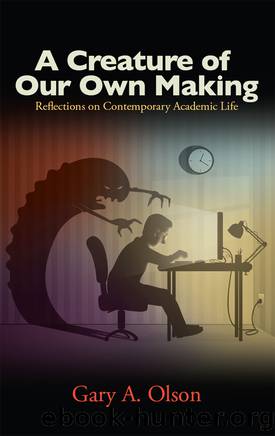A Creature of Our Own Making by Olson Gary A.;

Author:Olson, Gary A.; [Olson]
Language: eng
Format: epub
ISBN: 3408700
Publisher: State University of New York Press
Published: 2013-01-11T00:00:00+00:00
Only an accreditation process of that sort will resolve the principal obstacle to evaluating research published online. And only our most prestigious learned organizations can be trusted to review and endorse works of scholarship to the satisfaction of all involved. A certification process would give working scholars a modicum of faith in digital resources, and would enable tenure committees and administrators to make informed decisions.
While Internet aficionados might object that traditional print forums are not subjected to a similar certification process, conventional venues do not publish works regardless of their quality. All university presses and most scholarly journals are refereed, and the few journals that are not refereed at least have some gatekeeping in the form of the journal's editor.
Internet sites, in contrast, have no such mechanisms for quality control, and that is precisely why some kind of official recognition is necessary.
Some critics might object that the Internet and the scholars who publish online can regulate themselves, but I am not proposing âregulation.â I am calling for a voluntary process of certification. Site owners would be free to seek certificationâor not.
âSelf-regulationâ will not solve the primary problemânamely, that there is simply no way to know whether a site is dependable.
Other people might object that it would be difficult to construct guidelines governing site quality that are applicable from site to site. Yet scholars in each disciplinary area already judge the quality of scholarship every time they referee a manuscript for a university press or print journal. That process has worked well.
In fact, who better to judge the quality of scholarship in a field than peers active in that area? Certainly, each institution will need to articulate precisely how it will value electronic scholarship. But no colleague should be lost over âgenerational prejudicesââor, for that matter, tenured because a department could not detect substandard scholarship.
It behooves the disciplinary organizations to play an active role in instituting a mechanism of quality control for scholarly Web sites. The alternativesâchaos, or evaluation by nonexpertsâare unacceptable.
Download
This site does not store any files on its server. We only index and link to content provided by other sites. Please contact the content providers to delete copyright contents if any and email us, we'll remove relevant links or contents immediately.
The Art of Coaching Workbook by Elena Aguilar(50168)
Trainspotting by Irvine Welsh(21078)
Twilight of the Idols With the Antichrist and Ecce Homo by Friedrich Nietzsche(18324)
Fangirl by Rainbow Rowell(8819)
Periodization Training for Sports by Tudor Bompa(7947)
Change Your Questions, Change Your Life by Marilee Adams(7405)
This Is How You Lose Her by Junot Diaz(6476)
Asking the Right Questions: A Guide to Critical Thinking by M. Neil Browne & Stuart M. Keeley(5388)
Grit by Angela Duckworth(5322)
Red Sparrow by Jason Matthews(5226)
Paper Towns by Green John(4826)
Room 212 by Kate Stewart(4768)
Ken Follett - World without end by Ken Follett(4467)
The Sports Rules Book by Human Kinetics(4099)
Housekeeping by Marilynne Robinson(4085)
Double Down (Diary of a Wimpy Kid Book 11) by Jeff Kinney(3959)
Papillon (English) by Henri Charrière(3942)
The Motorcycle Diaries by Ernesto Che Guevara(3804)
Exercise Technique Manual for Resistance Training by National Strength & Conditioning Association(3798)
